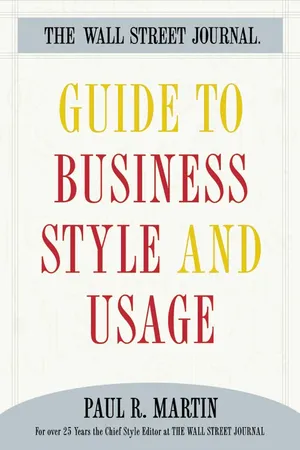![]()
AAA
The initials have become the formal name of the former American Automobile Association. Second reference may be to the automobile association. It is based in Heathrow, Fla.
a, an
Use a before consonant sounds: a historic event (the aspirated h is a consonant sound), a university (it sounds as if it begins with a yew), a one-year term (it sounds as if it begins with a w).
Use the article an before vowel sounds: an engagement, an hour (the h is silent), an M.B.A. (it sounds as if it begins with an e). Illogical though it may seem, make it an herb, but a herbal tea and a herbicide because the h in herb is silent, but the h in herbal and herbicide is sounded.
AARP
Use this in all references to the group that changed its name in 1998 from the American Association of Retired Persons.
abbreviations and acronyms
Widely recognized short forms are acceptable in second references, depending on the context. In general, for agencies such as the Bureau of Alcohol, Tobacco and Firearms, for example, try to use the bureau or the agency rather than BATF or the like after the first mention, to prevent a cluttered-looking text.
For proper-name acronyms of more than four letters, arbitrarily capitalize only the first letter: Ascap, Awacs, Swapo, Unicef. But unpronounceable abbreviations are uppercase: NAACP.
See organizations and institutions.
Guidance on particular abbreviations and acronyms is provided in individual entries. BEFORE A NAME: Abbreviate certain titles when they are used before a name: Col., Gen., Gov., Lt. Gov., Rep., the Rev., Sen. But Mr., Mrs., Ms. and Dr. (see entries) normally are used with the surname, only after the use of the full name in an article. Form plurals by adding s to the abbreviation: Sens. Max Baucus and Bob Kerrey. See individual listings for commonly used names.
See also cabinet titles; legislative titles; military titles; religious titles.
AFTER A COMPANY NAME: Abbreviate Co., Corp., Inc. and Ltd. after the name of a corporation.
See entries under these words. Also see foreign companies.
WITH DATES OR NUMERALS: Abbreviate A.D., B.C, a.m., p.m., No. and also certain months when they are used with the day of the month: In 45 B.C.; at 8:10 p.m.; bus No. 10; Nov. 17.
See months and individual listings.
IN ADDRESSES: Abbreviate Avenue, Boulevard, Road and Street in addresses with numbers: They live on Sunset Avenue—at 64 Sunset Ave., to be exact.
See addresses.
STATES AND NATIONS: State names of more than five letters are abbreviated when used after cities, except for Alaska and Hawaii. (See state names and individual entries of nations, as some are abbreviated in certain circumstances). U.S., U.K. and U.N. take periods, even in headlines. The U.S. abbreviation is used in most references, including company names.
COMPANIES AND ORGANIZATIONS: Abbreviated second references and acronyms don’t take periods: GM, GE, CIA, DAR, FBI, HUD, GOP, UCLA, MIT.
Use the article the before abbreviated agencies, organizations and unions: the DAR, the FCC, the UAW; but don’t use the article before acronyms: HUD, NATO. And don’t use the article before company names.
AVOID the overuse of abbreviations and acronyms, and don’t follow an organization’s full name with an abbreviation or acronym in parentheses.
ABC
The subsidiary of Walt Disney Co. no longer uses the name American Broadcasting Co. ABC and ABC Television Network may be used in the first reference.
ABCs
able-bodied
ABM,ABMs
The abbreviations are acceptable in all references to antiballistic missiles, but the term should be defined in the story. Avoid the redundancy ABM missiles.
A-bomb
Use atomic bomb unless a direct quotation is involved.
abortion rights
(n.) abortion-rights (adj.) This is the preferred term to apply to the movement sometimes referred to as prochoice.
See antiabortion.
about-face
aboveboard
absent-minded
absent without leave
AWOL is acceptable in second references.
academic degrees
If mention of degrees is necessary to establish someone’s credentials, the preferred form is to avoid an abbreviation and use instead a phrase such as: One has a doctorate and the other a master’s in psychology. Abbreviations such as B.A., M.A., M.B.A., J.D. and Ph.D. should be used only in stories where the need to identify many individuals by degree on first reference would make the preferred form cumbersome. Use these abbreviations only after a full name—never after just a last name. When in doubt about the proper abbreviation for a degree, follow the first listing in Webster’s New World Dictionary. IN HEADLINES: Use the same form, with the periods.
See doctor.
academic departments
Use lowercase except for words that are proper nouns or adjectives: the department of history, the history department, the department of English, the English department.
academic titles
Capitalize and spell out such formal titles as dean, president, chancellor and chairman when they precede a name. Lowercase elsewhere. But for professor: John Smith, a professor of history; the professor, Prof. Smith, Mr. Smith. See titles.
academy
See military academies.
Academy Awards
The awards, also known as the Oscars, are presented annually by the Academy of Motion Picture Arts and Sciences. Lowercase the academy and the awards when they stand alone.
Accenture
It became the new name for Andersen Consulting after its split from Arthur Andersen, the accounting firm.
accept, except
Accept means to receive.
Except means to exclude.
access
As a verb, confine it to the technological sense: He accessed the files in a database. You may access your cash at an ATM.
accommodate
accounting firms
The Big Five are PricewaterhouseCoopers; Andersen Worldwide (parent of Arthur Andersen); Ernst & Young; KPMG LLP and Deloitte & Touche.
accounts payable
They are the current liabilities or debts of a business that must be paid soon, usually within a year.
accounts receivable
They are the amounts due to a company for merchandise or services sold on credit. These are considered short-term assets.
accused
To avoid implying the guilt of someone merely charged with a crime, don’t us...

